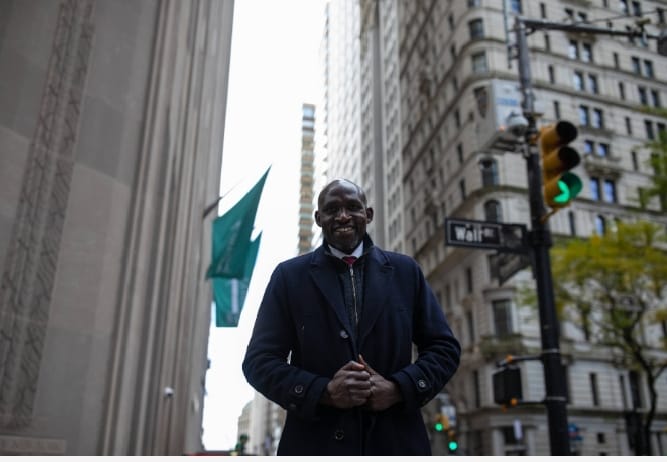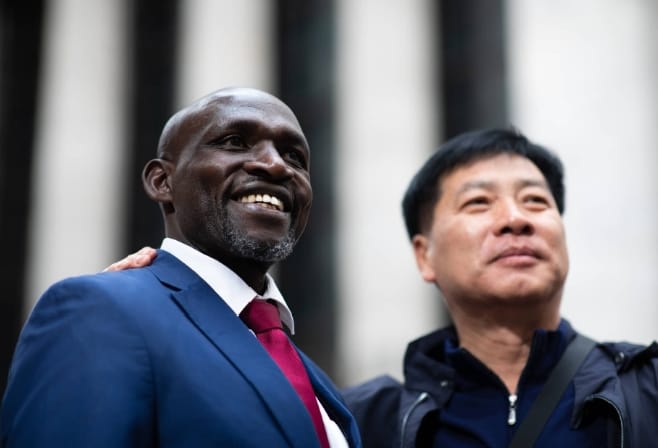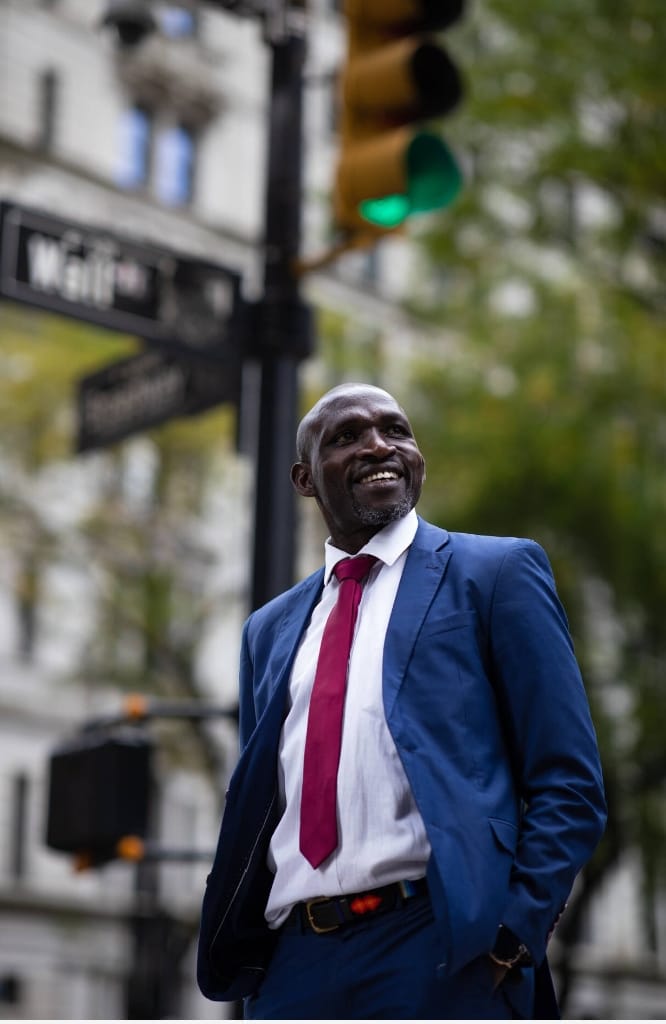In Union Square, a Global Voice Challenges Local Politics
Beneath the swirl of yellow leaves and the hum of city life, Union Square has found an unexpected orator, a man whose words travel far beyond borough borders.

Professor Fred Ogola, one of Kenya’s most outspoken presidential contenders for 2027, has arrived in Manhattan not to campaign for himself, but to champion a creed of leadership grounded in integrity, service, and measurable results.
Ogola, a respected academic, corporate strategist, and author of Solomonic Economics, has officially endorsed Andrew Cuomo for Mayor of New York City, drawing headlines on both sides of the Atlantic. His message? Leadership should be judged not by lineage or slogans, but by competence, character, and courage.
“Leadership is about character, competence, and service, not identity,” Ogola declared to a small but attentive crowd. “New York deserves a leader of results, not rhetoric.”
A Professor with a Presidential Vision

Fred Ogola’s story is one of quiet revolution. From his early years as a lecturer and business strategist in Nairobi to his rise as a public intellectual across East Africa, he has made it his mission to redefine what leadership means in a continentan d a world hungry for integrity.
A professor of strategy and governance, Ogola has long been known for his fearless critiques of corruption and performative politics. His framework of pragmatic governance challenges leaders to measure progress not in speeches or promises, but in tangible social outcomes.
Now, in New York, Ogola has taken that philosophy to the international stage. His endorsement of Cuomo is less about party politics than about principles.
“Cuomo’s record speaks for itself,” he said. “He fought corruption, delivered marriage equality, rebuilt infrastructure, and led with competence under pressure. That’s leadership by merit, not manipulation.”
The African Lens on American Politics
Ogola’s presence in the New York mayoral conversation is unconventional, yet deeply symbolic. In a world increasingly shaped by migration, global media, and interconnected economies, his intervention underscores the shared moral challenges facing democracies everywhere.
“Good governance is not African or American, it’s universal,” Ogola said in an interview between conversations with passersby. “Our societies may differ, but the principles that hold them together, justice, humility, accountability, are the same.”
As he speaks, curious New Yorkers stop to listen. Some snap photos; others ask questions about Kenya’s 2027 elections. To many, he represents something rare in modern politics: a leader who talks about power not as a prize, but as a burden of service.
A Cautionary Word on Character
Ogola’s endorsement comes with a pointed caveat and a warning about what he calls “the seduction of identity politics.” Drawing from personal experience, he voiced concern about Zohran Mamdani, another candidate in the mayoral race, citing his familiarity with the Mamdani family’s influence in Uganda’s academic and political life.
“I know the Mamdani family personally,” Ogola stated. “Their history at Makerere University and beyond is well known, marked by controversy and allegations of autocratic leadership. Leadership without humility breeds the same problems, whether in Kampala or New York.”
The comment struck a chord. In an era when voters increasingly weigh background and identity over performance, Ogola’s words cut sharply through the noise. His message: true leadership demands moral consistency, not pedigree or populism.
Solomonic Economics: Wisdom Meets Accountability
Ogola’s recently published book, Solomonic Economics, has made him one of the most intriguing thinkers in African political thought. Blending philosophy, economics, and theology, the book proposes that leadership must emulate the biblical King Solomon’s wisdom, a fusion of intellect, empathy, and moral courage.
He argues that a leader’s greatness lies in how they balance prosperity with justice a theme that resonates deeply with the city that never sleeps, where inequality and ambition live side by side.
“In both Nairobi and New York,” Ogola said, “leadership must ask the same question: how do we make progress without losing our soul?”
Global Lessons for Local Leadership
Ogola’s daily presence in Union Square, from 10 AM to 4 PM, through Election Day, has drawn curiosity, conversation, and even debate. His stand, set up amid activists, vendors, and commuters, has become an impromptu classroom where ideas about governance, ethics, and democracy collide.
Some approach him as a scholar, others as a fellow reformer. “He listens,” said one onlooker. “He’s not lecturing, he’s learning too.”

Indeed, for Ogola, New York is not just a backdrop, it’s a mirror. The challenges of corruption, inequality, and trust in leadership transcend borders. His mission, he says, is to remind people that citizenship is an act of stewardship, not entitlement.
“Whether you’re in Nairobi or New York, leadership must serve people, not ego,” he told a crowd gathered near the subway entrance. “If integrity is negotiable, then democracy itself becomes fragile.”
A Transcontinental Appeal for Integrity
As Fred Ogola speaks, it’s clear he’s not simply building alliances, he’s building bridges. His campaign in Kenya has emphasized transparency, accountability, and data-driven policy, themes that resonate strongly in a city still grappling with questions of fairness and reform.
He may be far from home, but his voice echoes across two continents: a call for leaders who measure success not by applause, but by impact.
“Voters should look beyond slogans and identities,” he said. “They should ask: who has delivered? Who has sacrificed? Who has proven results? Those are the questions that define a nation’s destiny, whether it’s Kenya or the United States.”

In a season of political theater and fleeting promises, Fred Ogola’s quiet conviction stands out. He may be a visitor in New York, but his message carries the weight of a statesman, a reminder that leadership, when anchored in service, speaks a universal language. Integrity knows no borders and sometimes, it takes a voice from afar to remind a city of what true leadership looks like.


This was valuable speech
Your point of view caught my eye and was very interesting. Thanks. I have a question for you.
**aqua sculpt**
aquasculpt is a premium metabolism-support supplement thoughtfully developed to help promote efficient fat utilization and steadier daily energy.
**back biome official**
Mitolyn is a carefully developed, plant-based formula created to help support metabolic efficiency and encourage healthy, lasting weight management.